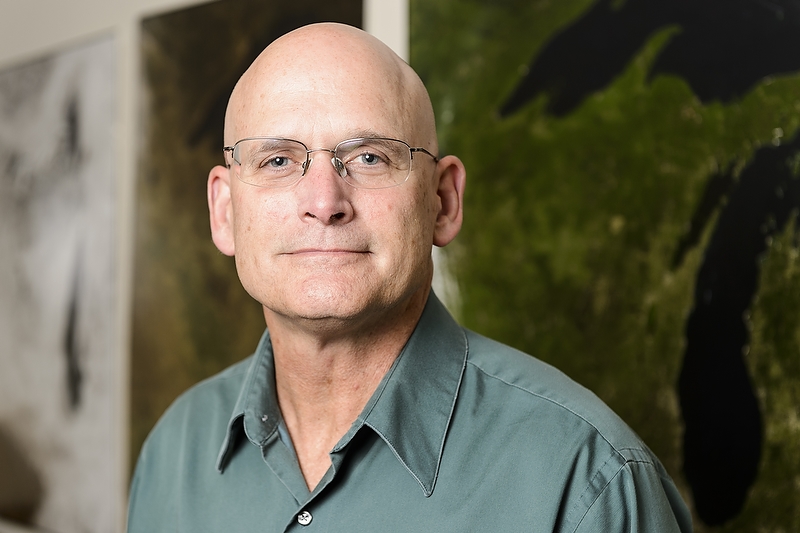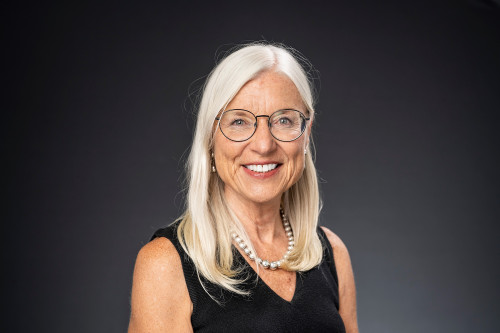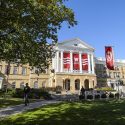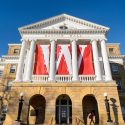Ackerman to retire from vice chancellor for research and graduate education post

Steven Ackerman has served as the vice chancellor for research and graduate education since August 2019. Prior to his appointment as vice chancellor, he served in a number of additional leadership roles, including associate vice chancellor of research in the physical sciences, interim director of the Space Science and Engineering Center and director of the Cooperative Institute for Meteorological Satellite Studies. Ackerman announced he will retire Sept. 15, 2023. Photo: Bryce Richter
Steven Ackerman, who has served as the University of Wisconsin–Madison’s vice chancellor for research and graduate education since August 2019, has announced he is retiring.
“I have been extremely happy serving as the vice chancellor for research and graduate education and being a champion for campus research and the Wisconsin Idea,” says Ackerman, whose last day in the office is Sept. 15. “Being vice chancellor has been a great opportunity to support research across all research divisions on campus by supporting our faculty and graduate students, providing data management solutions and advocating for the variety of tools and resources that our researchers need to drive their success in answering important research questions and providing solutions to some of society’s most pressing concerns.”
As vice chancellor, Ackerman oversaw the campus research response to COVID-19; helped lead the Institutional Review Board’s efficiency project; supported adding new faculty in key research growth areas; and championed strategic research initiatives that led to multidisciplinary teams, seeded innovative ideas and garnered success in generating extramural funding.
“Steve was a thoughtful, steady guiding hand during the pandemic and beyond,” says Chancellor Jennifer Mnookin. “He has also led important initiatives that have fostered growth and innovation across campus, and I am extremely grateful for his extraordinary dedication to the university and in service of the Wisconsin Idea.”
Mnookin has appointed Cynthia Czajkowski, associate vice chancellor for research in the biological sciences, as interim vice chancellor for research and graduate education.

Cynthia Czajkowski is the associate vice chancellor for research in the biological sciences. She will serve as interim vice chancellor for research and graduate education following Ackerman’s retirement. A national search for the next vice chancellor will begin this fall. Photo: Jeff Miller
“I’m looking forward to my new leadership role and working across campus and with our external partners to support the strong legacy of research, scholarship and graduate education at UW–Madison, and the Wisconsin Idea,” says Czajkowski. “This year, campus celebrates its 175th anniversary, and we have a lot to be proud of. I’m excited to be a part of the team looking ahead and supporting UW–Madison’s outstanding research investigators, staff and students to help solve complex problems facing Wisconsin, the nation and the planet.”
A national search for the next vice chancellor will begin this fall.
The Office of the Vice Chancellor for Research and Graduate Education oversees about $1.4 billion in annual research expenditures, a figure that places UW–Madison among the top 10 universities in the nation for volume of research. The OVCRGE includes administration of 19 cross-campus offices and research and service centers, including Research and Sponsored Programs and Discovery to Product, and maintains oversight of the Graduate School.
The vice chancellor for research and graduate education’s leadership team consists of faculty and staff members representing the various disciplines of research and graduate education, including administration, compliance, policy, physical sciences, biological sciences, social sciences, and arts and humanities. The OVCRGE also advances excellence in research and scholarship by strategically investing annual Wisconsin Alumni Research Foundation resources.
“My colleagues and I at WARF thank Steve for his exceptional service to the university,” says Erik Iverson, WARF’s chief executive officer. “I deeply appreciate Steve’s passion and effort in ensuring a strong and creative partnership with WARF, always guided by the well-being of UW–Madison and its incredible research enterprise. Steve challenged us to be creative in how WARF supports our great campus.”
Ackerman is an elected fellow of the American Meteorological Society and the Wisconsin Academy of Science, Arts and Letters. He is the recipient of a NASA Exceptional Public Service Medal, the Chancellor’s Award for Distinguished Teaching and the Dorothy Howard Prize for Folklore and Education for his work on the website and project, Wisconsin Weather Stories.
Ackerman has been on the UW–Madison campus since 1987, when he joined the Space Science and Engineering Center as an associate researcher. In 1992, he became a professor in the Department of Atmospheric and Oceanic Sciences and has served in a number of additional leadership roles since, including associate vice chancellor of research in the physical sciences, interim director of the Space Science and Engineering Center (SSEC), and for 18 years as director of the Cooperative Institute for Meteorological Satellite Studies.
As a scientist, his work has been dedicated to studying the energy balance of Earth’s atmosphere, driven by how much heat from the sun reaches the planet and how much escapes to space. He has mentored more than 60 master’s and doctoral students.
“I have greatly appreciated Steve’s support and collaboration, first when he was the CIMSS director,” says Brad Pierce, director of SSEC. “He’s also provided strong leadership and guidance as the vice chancellor, particularly as we navigated so many foundational changes to SSEC and UW–Madison in the last five years. I think that he has left OVCRGE in a better place, and I appreciate it.”
Ackerman is also known for talks around the state in which he describes the weather conditions that led to the sinking of the SS Edmund Fitzgerald on Lake Superior in 1975.
Ackerman has long been an ambassador of the Wisconsin Idea. With UW–Madison colleague and Professor of Atmospheric and Oceanic Sciences Jon Martin, he writes Ask the Weather Guys, a column in the Wisconsin State Journal, and he can be heard as a regular guest on Wisconsin Public Radio. Ackerman and Martin have been Wisconsin’s “Weather Guys” for more than two decades.
“It has been an indescribable pleasure to have been a friend and colleague of Steve for nearly 30 years,” Martin says. “His dedication to this university, its comprehensive mission to discover, enlighten and provide tangible benefits to the citizens of this state is truly peerless. His attention to his students and to their learning has been exemplary as well. The university, the state and his many colleagues will greatly miss his personable, empathetic influence on this campus, and I wish him well in his retirement.”
So, as one of the Weather Guys, what is Ackerman’s prediction for retirement?
“I’m looking forward to the opportunities that retirement will afford me, from having more time for curling to traveling, and especially spending more time with our growing family,” Ackerman says. “But if you are asking me to predict the weather forecast for today — is it going to be hot or cold? As a meteorologist, I’d have to say, ‘Yes.’”



